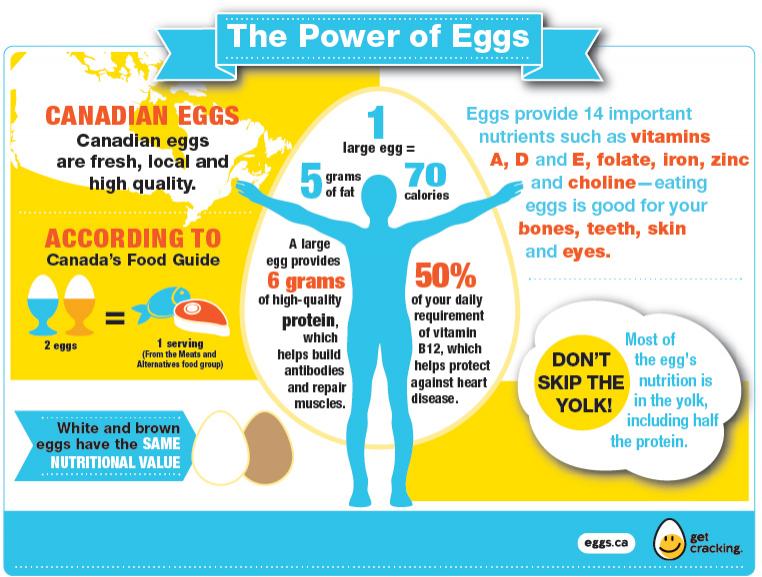Egg Nutrition
Eggs aren't just delicious. They're also extremely nutritious, an excellent source of protein and provide essential nutrients. Find out why you should include eggs as part of your diet and learn about maintaining a healthy lifestyle for yourself, your kids and even the elderly in your household.
Egg Nutrition
Eggs are one of nature's most nutritious foods. One large egg contains only 70 calories and an incredible amount of nutrition.
Egg Nutrition
Nutrition facts
One large (53g) Grade A egg contains 6 g of protein and only 70 calories. Canada’s Food Guide considers 2 eggs one serving from the Meat and Alternatives food group.

Nutritional Information per 53g serving:
| Calories | 70 Cal / 292.88.kJ |
| Fat | 5 g |
| Cholesterol | 195 mg |
| Sodium | 65 mg |
| Carbohydrate | 1 g |
| Protein | 6 g |
The vitamins and minerals of an egg and how they benefit you:
| NUTRIENT | BENEFIT |
|---|---|
| Iron | Carries oxygen to the cells, helps prevent anemia – the iron in eggs is easily absorbed by the body |
| Vitamin A | Helps maintain healthy skin and eye tissue; assists in night vision |
| Vitamin D | Strengthens bones and teeth; may help protect against certain cancers and auto-immune diseases |
| Vitamin E | An antioxidant that plays a role in maintaining good health and preventing disease |
| Vitamin B12 | Helps protect against heart disease |
| Folate | Helps produce and maintain new cells; helps prevent a type of anemia, helps protect against serious birth defects if taken prior to pregnancy and during the first 3 months of pregnancy |
| Protein | Essential for building and repairing muscles, organs, skin, hair and other body tissues; needed to produce hormones, enzymes and antibodies; the protein in eggs is easily absorbed by the body |
| Selenium | Works with vitamin E to act as an antioxidant to help prevent the breakdown of body tissues |
| Lutein and zeaxanthin | Maintains good vision; may help reduce the risk of age-related eye diseases, such as cataracts and macular degeneration |
| Choline | Plays a strong role in brain development and function |
Protein
With 6 grams of the highest quality protein and 14 key nutrients, eggs provide the energy needed to keep you going. They are a natural choice for a healthy, active lifestyle.
Eggs are one of the few foods considered to be a complete protein, because they contain all 9 essential amino acids. Amino acids are considered the "building blocks for the body" because they help form protein.
Omega-3
Omega-3s are a type of polyunsaturated fat, or healthy fat, known to help protect your heart. They are essential for good health, but our bodies don’t naturally produce them, which is why we have to get them from foods such as salmon, certain types of oils and nuts, and omega-3 eggs.
Cholesterol
You Can Probably Eat More Eggs Than You Think!
Decades of research have confirmed that dietary cholesterol (cholesterol in food) does not affect blood cholesterol or increase heart disease risk. Eggs can be included every day in a varied and balanced diet.
According to the American Heart Association, lutein found in egg yolks also protects against the progress of early heart disease.
For more information on the Canadian Egg Industry, visit: eggfarmers.ca.